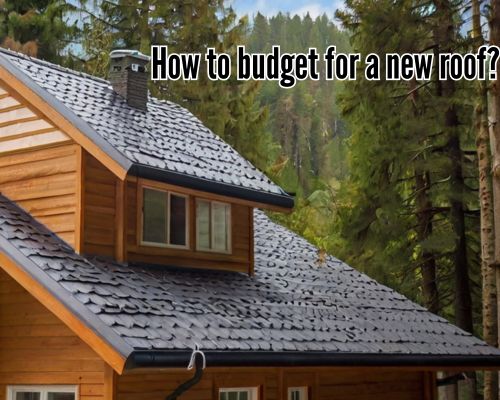When it comes to home improvement projects in New Jersey, few are as significant—or as costly—as replacing your roof. Whether you’re in Jersey City, Hoboken, Princeton, or anywhere along the Garden State Parkway, budgeting for a new roof requires more than just checking your savings. From understanding roofing materials and labor costs to factoring in local permitting fees, with Charles Jimerson of CJ Commercial Roofing NJ, we will break down how to budget for a new roof intelligently, ensuring your home is protected without blowing your budget.

Why Roofing Costs in New Jersey Vary
The first thing to understand is that roofing costs in New Jersey are influenced by multiple regional factors:
- Climate: With harsh winters, humid summers, and the occasional Nor’easter, NJ homes require durable materials like architectural shingles, metal roofing, or synthetic slate.
- Local labor rates: Roofing contractors in areas like Middletown, Cherry Hill, and Morristown often charge different rates based on demand and union labor.
- Municipal permits: Depending on your township or city, building permits can range from $100 to over $500.
- Home style and roof complexity: A steep-pitched or multi-gabled roof in Montclair will cost more than a simple ranch-style roof in Toms River.
These variables mean the average cost of a new roof in New Jersey can range from $7,500 to $18,000, depending on material and size.
Step 1: Know Your Roof’s Square Footage
Before you can set a realistic budget, you need to understand how much roofing you’re working with. Roofing is measured in “squares”, where one square equals 100 square feet.
Example:
- A 2,000 sq ft home with a moderately sloped roof could have a total roofing area of around 2,200–2,500 sq ft due to pitch and overhangs.
- This equates to about 22 to 25 roofing squares.
Pro Tip: Many roofing companies in New Jersey offer free inspections and measurements. Take advantage of this to get an accurate quote from local roofers in Edison or Parsippany.
Step 2: Choose the Right Roofing Material
Here’s where budgeting gets nuanced. The type of roofing material you select will dramatically affect cost, durability, and even home insurance premiums.
Common Roofing Materials in New Jersey:
| Material | Avg. Cost/Sq. (Installed) | Lifespan | Suitability |
|---|---|---|---|
| Asphalt shingles | $400–$600 | 15–30 yrs | Most common in NJ |
| Metal roofing | $700–$1,000 | 40–70 yrs | Great for snow load |
| Slate tiles | $1,200–$2,000 | 75–100 yrs | Ideal for historic homes |
| Synthetic roofing | $900–$1,500 | 30–50 yrs | Lightweight alternative |
Asphalt shingles remain the most popular in towns like Clifton and Newark, offering the best value per dollar. But if you live along the Jersey Shore, investing in metal or synthetic roofing might provide better protection from high winds and salt air.
Step 3: Get Multiple Quotes from Licensed NJ Roofers
To avoid overspending, get at least three detailed estimates from licensed roofing contractor. Look for roofers with certifications from GAF, CertainTeed, or Owens Corning, which are commonly recognized in the state.
Ask the following:
- Is cleanup and debris removal included?
- Are warranties on both materials and workmanship offered?
- What’s the projected timeline?
Local companies in Trenton, Freehold, or Bridgewater may even offer seasonal discounts, especially in late winter or early spring when business slows.
Step 4: Don’t Forget the Hidden Costs
Budgeting only for shingles and labor is a rookie mistake. Roofing projects often come with unexpected costs, so you should pad your budget by 10% to 15%.
Examples of hidden costs:
- Structural repairs: Replacing rotten decking or damaged rafters
- New flashing and vents
- Ice and water shield installation
- Skylight replacements
- Gutter repairs or upgrades
In northern New Jersey, where ice dams are common, installing extra underlayment and ventilation may be a must—not an upgrade.
Step 5: Financing and Roofing Incentives in NJ
Let’s say your budget is tight. Fortunately, there are several ways to finance a new roof in New Jersey:
- Home Equity Lines of Credit (HELOC): Low-interest borrowing against your home.
- Roofing-specific loans from credit unions and banks.
- Zero-interest payment plans through manufacturers or roofing companies.
- State energy-efficiency incentives if you opt for cool roofing or solar-compatible materials.
Look into NJ Clean Energy Program incentives for energy-efficient roof replacements, especially in conjunction with solar panel installation.
Step 6: Insurance Coverage: Will It Help?
Wondering if your homeowners insurance will help? Here’s the breakdown:
✅ Covered: Sudden events like hail damage, tree impact, or fire
❌ Not covered: Wear and tear, aging, neglect
If you suspect damage from a recent New Jersey storm, call in a licensed roof inspector before you file a claim. Some roofers in Union County offer assistance with insurance paperwork and can meet with adjusters on-site.
Step 7: Timing Is Everything in NJ
Roofing isn’t just about money—it’s about timing. Scheduling your project during off-peak seasons like late winter or early spring may reduce costs. Plus, you’re less likely to experience delays from high demand.
In regions like Bergen County, roofing companies often book out months in advance during summer, especially after storm season.
Final Thoughts: Smart Budgeting = Smart Roofing
Knowing how to budget for a new roof in New Jersey means going beyond the surface. It’s about understanding the local roofing landscape—from labor rates and weather demands to municipal permits and material choices.
✅ Get accurate measurements
✅ Choose materials suited for NJ’s climate
✅ Compare local quotes
✅ Factor in extras
✅ Investigate financing and incentives
Whether you live in Somerville, Hackensack, or Atlantic City, an informed budget today protects your biggest investment for decades to come.